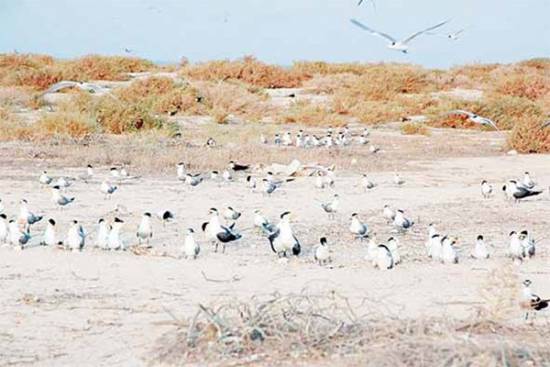Despite the significant and noticeable rise in temperatures in the country, the nature reserves, whether in Jahra or the islands, have turned into large settlements for migratory birds of various kinds, according to what bird watchers in the Kuwaiti Environmental Protection Society have to said in this regard who have monitored the presence of 7,600 different species of terns on the island, reports Al-Qabas daily. While the society expects that the number of terns in Kubbar to reach about 15,000, it is no secret that the flocks of birds will leave Kuwait at the end of its migration season next August heading towards the Indian Ocean.
The society revealed that 11 other birds’ species have been monitored in the Jahra Reserve. The Society stated according to records since 1954 about 391 species of migratory birds have been visiting Kuwait, while the diversity of migratory birds has been monitored in many areas since last March until this month, starting from the areas of Al-Zour Port, Jahra, Doha, Al-Wafra and the Green Island.
Meanwhile, the Environment Public Authority documented the settlement of large numbers of terns in Kubbar, whose environment is characterized by low sandy coasts. The EPA referred to 4 species of “tern” that inhabit the island in the summer (from May to August) to reproduce in large numbers, despite the harsh temperatures that sometimes reach more than 50 degrees Celsius, and the lack of fresh water sources. The EPA mentioned that the four types of terns found in Kubbar are: Portal, White Cheeked, Small Crested, and Large Crested, as they build single nests or in the form of close colonies, impeding the landing of predatory birds.
The EPA added that it has been observed some senior terns guiding their young from the island’s coast to the sea to learn about the surrounding environment and also to receive one of the parents to feed them. The sources indicated that the presence of these types of migratory birds helps the ecological balance because of their role in transporting seeds and nutrients from one place to another, traveling thousands of kilometers, forming a link between ecosystems in different parts of the world.
The authority called for the preservation of these species and the environments frequented in the country, including the islands, in order to sustain the environment and its biodiversity, in addition to fulfilling Kuwait’s obligations towards regional and international agreements, such as the Convention on Biological Diversity and the Convention on the Conservation of Wildlife and its Natural Habitats in the Gulf Cooperation Council states./AT


